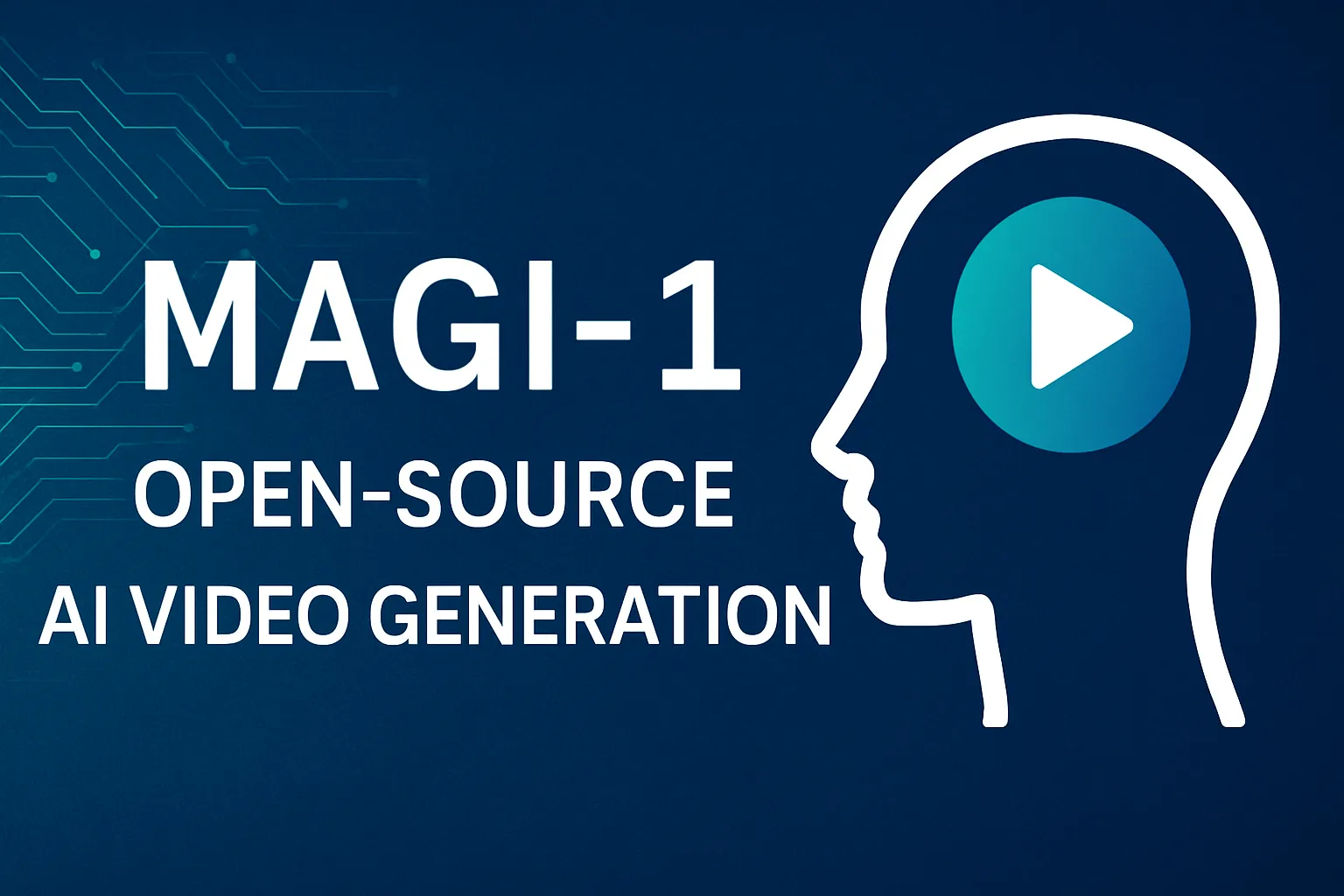What is MAGI-1 AI?
MAGI-1 is an advanced open-source AI video generation model developed by Sand AI and released in April 2025. It uses an autoregressive, chunk-by-chunk video diffusion process to generate videos up to 24 frames (about 1 second) at a time. Its open-source nature (Apache 2.0 license) sets it apart from proprietary tools like OpenAI’s Sora and ByteDance’s Kling.
Target users include:
- AI developers and researchers
- Content creators
- Virtual reality and game developers
- Filmmakers and storytellers
Key Features of MAGI-1
🔁 1. Autoregressive Chunk Generation
MAGI-1 generates videos in sequential 24-frame segments. This allows temporal consistency and low-latency streaming, making it ideal for real-time applications like gaming and interactive storytelling.
⚙️ 2. Transformer-Based VAE
The model compresses data 8x spatially and 4x temporally, enabling fast processing while maintaining visual quality. This structure makes it more efficient than other diffusion models.
💨 3. Diffusion Transformer Architecture
MAGI-1 is built with:
- Block-Causal Attention
- Parallel Attention Block
- QK-Norm & GQA
- Sandwich Normalization
- SwiGLU and Softcap Modulation
These innovations result in faster training and higher output quality.
🧪 4. Advanced Distillation Algorithm
Using a self-consistency constraint, MAGI-1 supports multiple inference speeds without sacrificing accuracy—perfect for creators with varying hardware capacities.
How MAGI-1 Works
MAGI-1 operates in an autoregressive video generation loop:
- Processes each 24-frame video chunk
- Begins generating the next chunk once the current one is partially denoised
- Allows parallel generation of up to 4 chunks for speed
This approach contrasts with whole-video generation, giving MAGI-1 an edge in flexibility and performance.
Performance: MAGI-1 vs Competitors
MAGI-1 outperforms top models in several benchmarks:
| Model | Video-to-Video (V2V) | Image-to-Video (I2V) |
|---|---|---|
| MAGI-1 | 56.02 | 30.23 |
| Kling 1.6 | 50.78 | 22.56 |
| VideoPoet | 47.30 | 18.90 |
⭐ Human Evaluation:
- Better instruction-following than Kling 1.6
- Slightly behind in “overall preference,” but stronger in motion realism and prompt adherence
How to Use MAGI-1
You can use MAGI-1 on multiple platforms:
▶️ Getimg.ai
- Generate videos from text or image prompts
- Supports 5–8 second video clips
- No installation needed
- Free and paid plans available
🧠 Hugging Face
- Download model weights
- Run in Python scripts
- Great for researchers and developers
🐳 Docker
- Advanced users can run MAGI-1 in Docker environments
- Allows full control over video input/output, batch processing, and model versioning
MAGI-1 Hardware Requirements
MAGI-1 comes in multiple sizes for different GPUs:
| Model Version | Recommended GPUs |
|---|---|
| MAGI-1-24B | 8× H100 or H800 GPUs |
| MAGI-1-24B-distill | 8× H100 or H800 GPUs |
| MAGI-1-24B-distill+fp8 | 4× H100 or 8× RTX 4090 GPUs |
| MAGI-1-4.5B | 1× RTX 4090 GPU |
Final Thoughts: Why MAGI-1 Matters
MAGI-1 represents a new era of open-source AI creativity. Its combination of high performance, innovative architecture, and accessibility makes it a game-changer for:
- AI-generated film
- Real-time video environments
- Educational content
- Storytelling and animation
By democratizing video generation, MAGI-1 empowers a global community of creators.
FAQs
🔹 Is MAGI-1 better than OpenAI’s Sora?
MAGI-1 is open-source and excels in instruction following and motion realism. While Sora is more polished commercially, MAGI-1 offers more flexibility and community support.
🔹 Can I use MAGI-1 on my laptop?
Only the smaller model (MAGI-1-4.5B) is viable on high-end consumer GPUs like the RTX 4090. Other versions require server-grade hardware.
🔹 What type of videos can MAGI-1 generate?
You can create:
- Short films
- AI video art
- Animated scenes
- Science visualizations
- Social media clips (TikTok, Reels)
Ready to start creating?
Try MAGI-1 today on getimg.ai or explore the source on Hugging Face.

